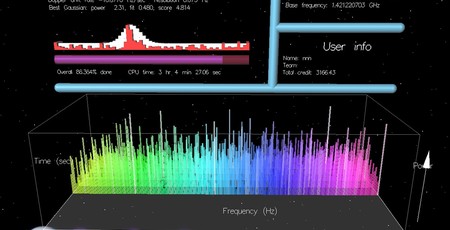
SETI@home no longer needs our help in the quest to find extraterrestrial life, it's been announced.
In a statement, the Berkeley SETI Research Center explained that they have enough data to analyse for now and want to focus on completing their back-end analysis. Effectively, they have a huge backlog thanks to everyone's good efforts and they need to work on it.
That's somewhat understandable given the project has been running since 1999 with people from across the world donating their spare CPU resources to search for such alien life. If you've never participated, users would be sent small projects, known as jobs, whereby their PC was used to process small chunks of data in a bid to find interesting radio transmissions or unusual activity. Results and findings were then sent to SETI. Basically, it was a form of cloud computing before the term was popularised. Oftentimes, groups of users would team up to compete on leaderboards, with everyone bidding to be top dog because, well, who doesn't want to 'win' at something, right? It was a curiously addictive process, not least because it was a way to benchmark your PC and show off how quickly your CPU could process.
In the announcement, the project explained that new data will no longer be sent to SETI@home clients from March 31st due to having reached a "point of diminishing returns". The plan now is to analyse what has already been gleaned with a scientific paper in the workings afterwards.
If you're keen to continue to participate in this form of distributed computing, SETI@home has made some recommendations of where else you can get involved. These include projects such as Asteroids@home, Climateprediction.net, and IBM's World Community Grid. There's also the possibility of switching to Folding@home which is currently working on figuring out the structures of proteins on the surface of the SARS-CoV-2 coronavirus which is sure to be useful.
While none will be quite as magical as how SETI@home grabbed many users' hearts, these are all still immensely worthy causes. While there are spare CPU resources to take advantage of, one of these seems like a good bet.
For now, let's bid a fond farewell to SETI@home and hope that the scientific paper proves to be a fascinating read one day.

MSI MPG Velox 100R Chassis Review
October 14 2021 | 15:04








Want to comment? Please log in.